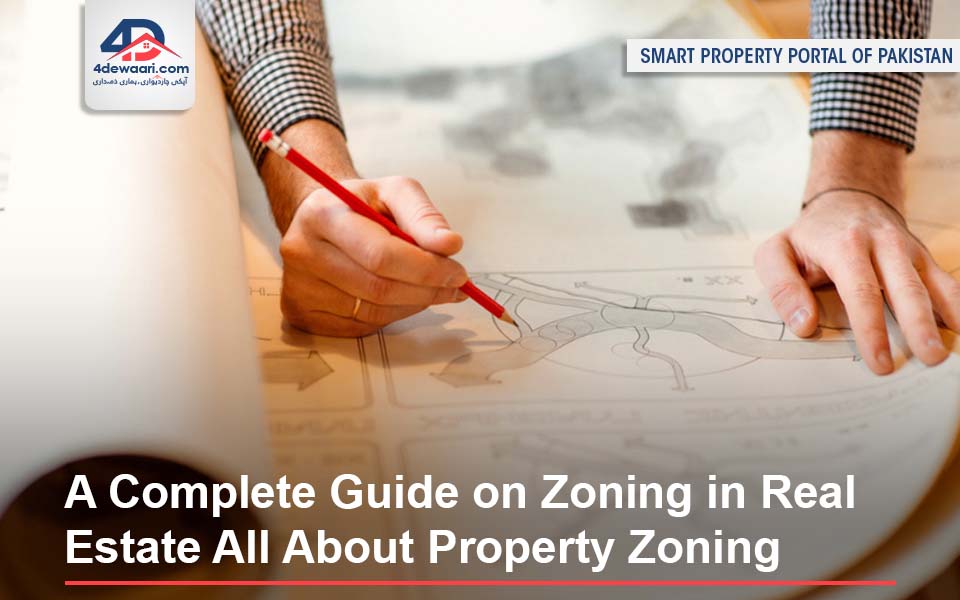You've found the perfect property, and now you're ready to put in an offer. Not so fast. Before buying your dream home, learning about zoning is essential, especially if you plan to use the property as anything other than your primary residence. There are various zoning laws in different places. They can affect many property factors, including what you can do with it and how much you'll be allowed to change it. The following guide on Property Zoning in Real estate will give you all the information you need to understand how zoning works and how it can affect you. Whether you're a potential homeowner or looking to invest in real estate properties for business purposes, this guide will significantly help you about
What guides most local zoning in real estate?.
What Is Zoning In Real Estate?
Zoning is the act of giving a specific area or lot a designation for what people can use it for. In simple words, zoning provides guidelines and rules that determine how land may be used and what types of buildings are allowed within a given area. The local government uses zoning to regulate the building and expansion of real estate in a particular area. These authorities often set these regulations so developers know how they should design their projects. In some cases, those decisions are controversial because specific neighbourhoods don't want developments that will disrupt their way of life and threaten the character of their community.
Real Estate Zoning Examples
A person who buys a property may have an idea of what they plan to do with it. However, zoning laws can change those plans.
For example, suppose the authority zone the land as residential, but the homeowner wants to open a restaurant or store. In that case, they cannot do it legally without changing the zoning first. Zoning boundaries are essential. Hence, we should thoroughly research it before buying a property. Another example is that the town authority might zone a large lot for building up to five homes. Suppose the buyer intends to build five homes and subdivide that land. In that case, they will need approval from the local government before moving forward with their project.
To learn more about zoning in real estate, keep reading.
Read Also
How to Avoid Common Frauds in Property
Importance Of Zoning In Real Estate
Zoning is essential as it controls what types of buildings can be built on land and how high they can go.
- Benefits Of Zoning In Real Estate
- Zoning may safeguard and raise the value of properties.
Existing neighbourhoods may be protected through zoning. - Zoning can stop blending conflicting land uses (such as dance clubs and schools).
- Zoning may enable improved lot configuration. Open space and recreation places can be safeguarded by zoning.
- Parking spaces can be made available in sufficient numbers thanks to zoning.
- Zoning gives the neighbourhood authority over future land uses, aesthetics, and life satisfaction.
Limitations Of Property Zoning
Zoning may prevent specific construction in some areas.
Building new structures can cost more when zoning is involved.
Zoning can, to some extent, stop the construction of land uses and buildings that already exist but do not meet zoning requirements.
In older cities, zoning can be detrimental to historic blended areas.
Read Also
Small Scale Investment Opportunities in Real Estate
The Types & Classification Of Zoning In Real Estate
Town zoning can be split into five categories: residential, commercial, industrial, mixed, and agricultural.
Residential Zones One of the most critical aspects of land zoning is residential zones.
Residential zoning has various divisions. However, the two most common are single-family residential and multi-family. Single-family refers to one residence on a lot. At the same time, a multi-family would be a multiple-unit structure or an apartment building.
When a residential zone is established, specific requirements must be met for the property to remain zoned.
For example, single-family housing might only allow structures up to three floors tall. In comparison, multi-family might enable designs to be up to six stories tall.
Commercial Zoning
Commercial zoning, sometimes called C-2 zoning, pertains to various commercial uses, including retail stores, restaurants, office buildings, medical offices or other business enterprises.
Authorities designate these zones for properties built at a certain height to accommodate the businesses occupying them.
There are two types of commercial zoning:
High-Density Zones (C-3)
Low-Density Zones (C-1)
High-density zones allow for large structures such as skyscrapers. However, low-density zones do not.
For example, if you were to build an office building, you would need a zone designation of C-3.
Mixed-Use
A Mixed Use Zoning district is an area that has a mix of residential, commercial, and other facilities.
It can also be defined as an area where more than one zoning district overlaps. Owners can use it for areas with large concentrations of office buildings and retail shops.
In this type of zoning, no zoning laws are prioritized over the others.
Industrial Zone
Industrial zoning is typically used for factories, warehouses, transportation facilities, power plants, or industrial manufacturing.
To use this type of zone, you will need a permit. However, the permit process varies depending on the city in which you live.
In most cases, you will need to contact your city's Planning Department to learn more about their specific guidelines and requirements.
Agricultural Zones
The largest classification of zoning is agricultural. It includes any area owners can use for farming, ranching, or forestry purposes.
Many of the rural population live in these zones and small towns outside a metropolitan area but are still close enough to farm.
Agricultural zones typically do not lie within city limits
Property Zoning Lookup
If you're thinking about buying or selling property and want to know what kind of zoning it has, there are some steps that you should take.
Start by searching for the address on the internet. Enter the address into any search engine and then look for any zoning information.
Your next step would be to speak with an expert real estate agent knowledgeable about land use law. After this, you should meet with someone at the town hall. Lastly, it would be best to appoint a lawyer to examine the agreement you and the seller have.
Final Thoughts
To sum up, zoning for real estate involves many intricate details. Suppose you are looking for a property in a specific location and want to ensure that the government will zone it for your intended use. In that case, it is always best to consult with an expert before making any offers.
Moreover, zoning laws differ from city to city and play a massive role in determining what types of construction you can have and where. So, if you're looking for a home in one place, you must understand the zoning laws before you begin searching.















